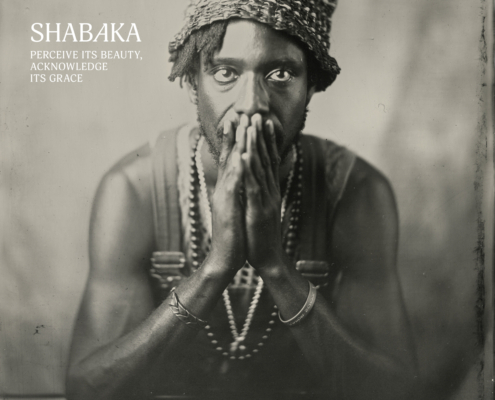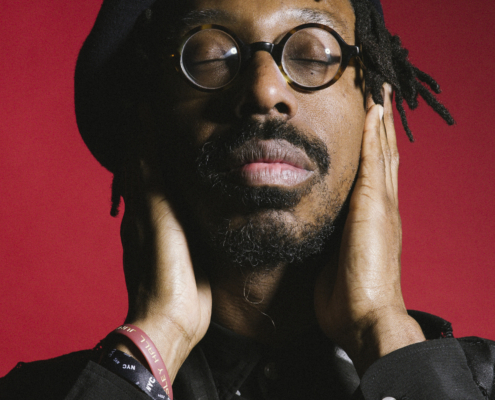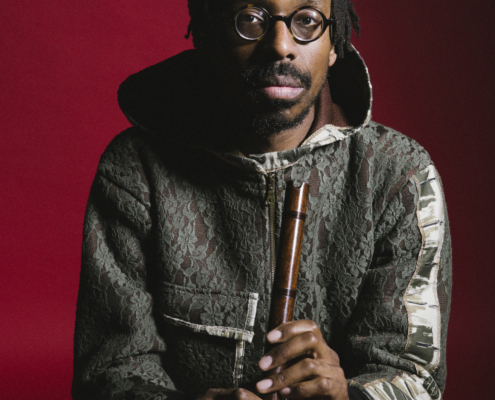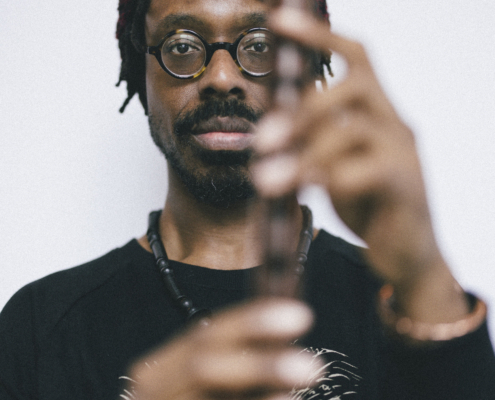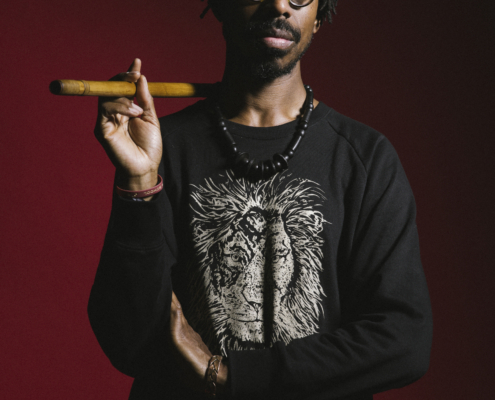Shabaka – Perceive its Beauty, Acknowledge its Grace
- End Of Innocence
(Shabaka Hutchings)
Shabaka: Clarinet
Jason Moran: Piano
Nasheet Waits: Drums
Carlos Nino: Percussion
- As The Planets And The Stars Collapse
(Shabaka Hutchings/ Miguel Atwood-Ferguson)
Shabaka: Shakuhachi
Brandee Younger: Harp
Charles Overton: Harp
Miguel Atwood-Ferguson: Violin, Viola, Cello
- Insecurities (featuring Moses Sumney)
(Shabaka Hutchings/ Moses Sumney)
Shabaka: Flute
Moses Sumney: Vocals
Charles Overton: Harp
- Managing My Breath, What Fear Had Become (featuring Saul Williams)
(Shabaka Hutchings/Saul Williams)
Shabaka: Flute
Saul Williams: Vocals
Charles Overton: Harp
- The Wounded Need To Be Replenished
(Shabaka Hutchings)
Shabaka: Flute
Nduduzo Makhathini: Piano
Carlos Nino: Percussion
Surya Botofasin: Synthesizer
- Body To Inhabit
(Shabaka Hutchings/ Chaz Jerome Hall)
Shabaka: Flute
E L U C I D: Vocals
Brandee Younger: Harp
Charles Overton: Harp
Esperanza Spalding: Bass
Chris Sholar: Electronic Percussion
- I’ll Do Whatever You Want (featuring Floating Points
and Laraaji)
(Shabaka Hutchings/Sam Shepherd/Laraaji)
Shabaka: Shakuhachi
Laraaji: Vocals
Floating Points: Rhodes Chroma
André 3000: Flute
Tom Herbert: Bass
Dave Okumu: Guitar
Esperanza Spalding: Bass
Marcus Gilmore: Drums
Carlos Nino: Drums
- Living (featuring Eska)
(Shabaka Hutchings/ Miguel Atwood-Ferguson/Eska Mtungwazi)
Shabaka: Flute
Eska: Vocals
Miguel Atwood-Ferguson: Violin, Viola, Cello
Brandee Younger: Harp
Charles Overton: Harp
- Breathing
(Shabaka Hutchings)
Shabaka: Clarinet, Flute, Shabaka
Rajna Swaminathan: Mridangam
- Kiss Me Before I Forget (featuring Lianne La Havas)
(Shabaka Hutchings)
Shabaka: Flute
Lianne La Havas: Vocals
Jason Moran: Piano
Nasheet Waits: Drums
Carlos Nino: Percussion
- Song Of The Motherland (featuring Anum Lyapo)
(Shabaka Hutchings)
Shabaka: Flute
Anum Lyapo: Vocals
Charles Overton: Harp
Als kreativer Kopf von eklektischen Bands wie Sons Of Kemet und Shabaka And The Ancestors sowie Mitglied des Trios The Comet Is Coming bewegte sich Shabaka Hutchings über zehn Jahre beharrlich abseits ausgetretener musikalischer Pfade. Eigentlich sollte einen bei einem solch vielseitigen Künstler nichts mehr überraschen, aber als er 2022, nur noch unter seinem Vornamen, seine erste Soloaufnahme, die EP “Afrikan Culture”, veröffentlichte, horchten Fans und Medien dennoch auf.
“Auf der neuen Platte – mit acht meditativen Tracks und einer Gesamtspieldauer von unter einer halben Stunde – setzt sich Shabaka einmal mehr über alle Erwartungen hinweg”, schrieb DownBeat. Der britische Guardian stellte “Afrikan Culture” auf eine Stufe mit aufsehenerregenden jüngeren Ambient-Jazz-Projekten wie “Space 1.8” von Nala Sinephro und “Promises” von Floating Points, Pharoah Sanders und dem London Symphony Orchestra und meinte: “Der erste Solo-Ausflug des Saxofonisten bietet eine Verlagerung zum Meditativen, knistert aber trotzdem noch vor der für ihn typischen Energie”.
Als Shabaka, der längst als einer der wegweisenden Saxofonisten seiner Generation galt, dann auch noch verkündete, dieses Instrument für eine nicht näher definierte Zeit niederzulegen und auch seine drei Ensembles ruhen zu lassen, war dies eine kleine Sensation, der ein überraschendes Medienecho folgte.
Jetzt kehrt Shabaka mit seinem ersten Werk in Albumlänge unter eigenem Namen zurück. „Perceive Its Beauty, Acknowledge Its Grace” ist eine bewegende Suite aus in erster Linie instrumentaler, meditativer und kontemplativer Musik, auf der Shabaka auf einer Vielzahl verschiedener Flöten zu hören ist. Als Gäste hat er Künstler wie Andre 3000, Lianne La Havas, Moses Sumney, Floating Points u.a. hinzugeladen.
INFO
Perceive its Beauty, Acknowledge its Grace by multi-instrumentalist Shabaka Hutchings is, in a sense, a debut album. And yet, the album also serves as a reintroduction to the artist, a levitating, stunning work chock full of the lessons he’s learned over the course of his life and career. And perhaps, most importantly, it represents the spirit of exploration that the artist is most tapped into these days.
London-born, Shabaka spent much of his childhood in Barbados. Beginning at age nine, he studied the clarinet, playing in calypso bands while studying classical repertoire, often practicing over hip hop beats by artists such as Nas, as well as to the music native to Barbados. He imparted that at the time, “The idea of being a particular ‘type’ of musician who limited themselves by genre was totally alien to me and my peers, it was just about playing with skill and dedication, and whether music moved me or left me cold.”
Consequently, after studying clarinet at Guildhall School of Music from 2004-2008, he collaborated on a kaleidoscopic range of projects: recording and/or touring with Mulatu Astatke and the Heliocentrics, Soweto Kinch, Floating Points and Courtney Pine amongst many other bands, as well as being a part of the London Improvisers Orchestra. He’s also composed pieces for the BBC Concert Orchestra, London Sinfonietta, Ligeti Quartet, and performed the Copland Clarinet Concerto with the BBC National Orchestra of Wales, Britten Sinfonietta as well as the Knoxville Symphony Orchestra.
Over the course of the past decade, the lion’s share of his touring and recorded work has been with three bands: Sons of Kemet, The Comet is Coming and Shabaka and the Ancestors. “In these formations,” he shared, “I’ve been able to display a fundamental approach to creative practice in different contexts spanning Afro-Caribbean fusion, London dance music club culture and the rich South African jazz tradition – all within the freedom afforded by the legacy of the American ‘jazz’ tradition.” That approach reflects a mantra he absorbed early in his life.
“My primary school teacher told me ‘the music isn’t hard, just practice it mechanically then relax and let your soul shine through’. This is an adage which I’ve kept throughout my life of learning how the music and instruments of different cultures relate to my personal vision of sound.”
His musical exploration includes employing a variety of flutes, including the ancient Japanese Shakuhachi, which he started playing in 2020 during the pandemic. “Since then, it has slowly changed the scope of my musical inner landscape and drawn me towards a multitude of other instruments in the flute family,” he explained. “As more flutes have been added to my arsenal including Mayan Teotihuacan drone flutes, Brazilian Pifanos, Native American flutes and South American Quenas, I’ve started to appreciate the underlying principles that cause these instruments to resonate most fully and use this understanding to form a concept allowing me to freely move between instruments.”
On New Year’s Day 2023, in the wake of the release of his 2022 debut EP, Afrikan Culture (which notably featured the artist primarily on flutes), Shabaka announced that beginning in 2024 he’d take a hiatus from playing the saxophone publicly. He clarified in July 2023 on his Instagram page his intention to cease playing with bands in which the saxophone was his primary instrument (including The Comet Is Coming, Sons of Kemet and Shabaka and the Ancestors).
For the flute-forward album Perceive its Beauty, Acknowledge its Grace, Shabaka tapped into a remarkable cadre of players, including percussionist Carlos Niño and bassist Esperanza Spalding. Vocalists including Saul Williams and Lianne La Havas contributed to “Managing My Breath, What Fear Had Become” and “Kiss Me Before I Forget”, respectively. Floating Points, with whom Shabaka shared a stage with for their performance of Promises at the Hollywood Bowl, provided additional production on the track “I’ll Do Whatever You Want“.
“I invited a bunch of musicians I’ve met and admired over the past few years of touring throughout the United States to collaborate and everyone said yes, which I constantly find breathtaking,” he disclosed. His aim was to gather the musicians at Rudy Van Gelder’s historic studios, which he says “informed the sound of so many seminal jazz albums that have shaped my musical aptitude. We played with no headphones or separation in the room so we could capture the atmosphere of simply playing together in the space without a technological intermediary. After recording hours of inspired interactions, I set to work producing an album from the material.”
When asked about the meaning of the song’s titles, he explained that his previous album’s song titles can be read as poems, respectively. “The narrative aspect of my albums is always intentional,” he explained. “Around the release of the Shabaka and the Ancestors album We Are Sent Here by History, I coined the term ‘sonic poems’ to express how I’m intending the listener to relate to the words associated with the sounds contained on the disc. Each title on this disc was extracted from a longer poem written specifically for the album which only achieved its full meaning in the presence of the music.”
He further relayed that “How the listener interprets the words in relation to the sounds is personal and it’s this subjective unravelling of complex ideas that’s an integral part of the journey I intend to take the listener on. This idea permeated sons of Sons of Kemet’s Black to the Future album whereby each track title reads as a poem. Perceive its Beauty, Acknowledge its Grace follows in this tradition of titles as symbolising a narrative which is necessarily subjective and expansive in relation to the listener’s experience with the heard music.”
–Ayana Contreras
Live
08.05.24 Berlin Emmauskirche / XJAZZ
Weitere Infos in unserem Presseportal unter
https://journalistenlounge.de – bitte dort über den Genrefilter „Jazz“ anwählen!
PR Radio
Universal Music Jazz (Deutsche Grammophon GmbH)
Mühlenstr. 25, 10243 Berlin
Impulse! Records / Universal Music
CD 00602465050356 / LP 00602465043112
VÖ: 12.04.2024
Live
08.05.24 Berlin Emmauskirche / XJAZZ

